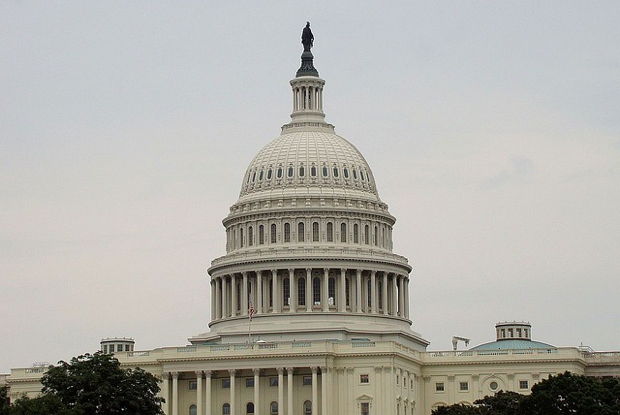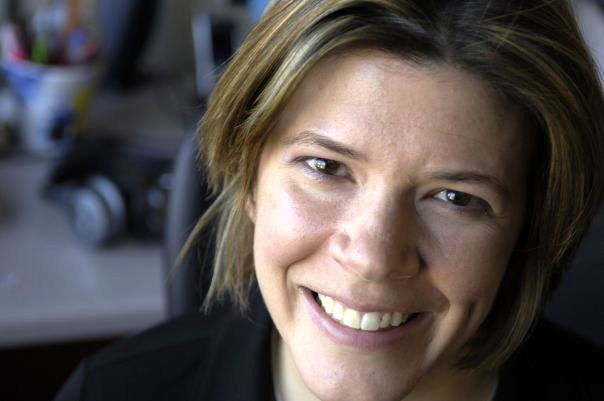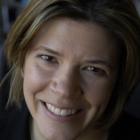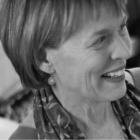Hello Diane — it’s so good to meet you. I understand that this year you were planning to be living in DC, but because of a family health crisis your plans have changed?
Yes. My husband is also an academic, and we have three children. When I got this opportunity, we were very excited about it. We both knew that this would be an exciting thing for me to do, and we agreed that the first year I would commute back and forth to Washington, DC, and the second year, we would all go and have this fun year exploring DC as a family.
But between the time I accepted the job and started the job, my very beloved sister, who lives about a mile from us and doesn't have a husband or kids of her own, was diagnosed with terminal cancer. We have always provided emotional support to each other and she's such an important part of our kids' lives that we just couldn't plan on being away for a year. So I'm going to continue to commute four days a week to DC.
What is involved with your work in DC?
I’m directing The Hamilton Project, an economic policy think tank that looks for policies that will promote broad-based economic growth. We go out to leading academic thinkers who have done research in a wide array of areas that relate to broad-based economic growth, from education policy to retirement savings policies to healthcare, infrastructure investments — all across the board. And we ask these academics who have been thinking about these issues, often for ten years or more, "Based on all of your research, tell us what you think is the best thing to do to move forward on whatever aspect of this you know best." We put their responses through a rigorous process including peer review, but we also want to make it understandable to people on Capitol Hill. And that's hard, because a lot of academics speak in jargon — we're often cautious about saying what we think you should actually do. Our model at The Hamilton Project is to push academics to say, "This is what we think you should do."

How do you decide which area to address?
I've been getting a lot of advice, both from academics and policymakers. Then I make a choice whether to commission a policy proposal based on whether there is good evidence in a certain area that we need to bring to bear in policy, or whether the topic is an important upcoming issue. The goal is to bring our best and brightest academics to weigh in on evidence-based policy. My own expertise is in childhood poverty and related policies, including education and the safety net, and I have commissioned several proposals in that area. I’ve particularly enjoyed learning about some new areas of policy — for example, we have proposals coming out on criminal justice reform, climate change, and all sorts of things.
How did you develop your interest in economics and working on issues related to poverty?
I fell in love with the field of economics as an eighteen-year-old in Econ 101 at Wellesley College. When I was an undergraduate, I knew that I liked math and was pretty good at it. And when I took this Economics 101 class, I saw that you can use math to better understand economics and to design public policies that help the lives of a lot of people. I worked in policy for two years between undergrad and grad school, and then I went to Princeton for my PhD in economics and all throughout have been interested in using the tools of economics to inform public policies — in particular, to improve the lives of poor kids.
How has your faith impacted your work and your research? Is there a connection there for you?
Yes. I think my interest in studying the economics of human flourishing comes directly from my faith. That's not to say that economists who want to study anti-trust don’t also have their faith impact their work, of course. But for me, that Econ 101 class brought together so well my natural skills in math and my love of people and social justice, which comes directly from my faith in Jesus. I feel very fortunate that I'm able to do this work that I love, that I think contributes to the broader kingdom.
I was on NPR a couple of months ago talking about some of my research. And our old pastor from the city heard me and wrote me this note: "I'm so glad to see you doing this important work, because I know that you do it because you love the Lord." It meant the world to me to have him make that point, and it’s absolutely true.

On Her Research About the Food Stamp Program
What did you study for your PhD research?
My PhD research looked at a topic [laughs] that only an economist could love: the economic puzzle of whether people use food stamps essentially just like they would cash or whether they treat them differently. I found they mostly do treat food stamps like cash. But this made me an expert on the food stamp program. This has been useful because over the course of my career, the food stamp program has become a bigger and bigger part of the social safety net. It turns out I'm one of relatively few people who focus on this program, and I've been working on it for a long time.
As the program has become larger, there's been more and more demand for what I work on. When I was finishing up my dissertation research and going out on job talks, I remember looking up at one point and two of the people at the table had fallen asleep — my research was so boring to them [laughs]. But after you work long enough at something that's an important topic, sometimes it finally gets recognized as critical work.
A lot of my work has looked at the introduction of the food stamp program, which rolled out on a county-by-county basis, starting in 1963. And it was not until 1975 that every county had access to the program. That variation gives us the ability to do comparisons between areas that did and did not have access to the program. I have a series of papers where we measure the impacts of the program.
I'm an economist, so the first thing we looked at was what happens to spending patterns. And then, we considered what happens to labor force participation. But then, after looking at the big economic questions, we wanted to really understand, how does this program impact human flourishing? The next question became: Were babies who were in utero when this program began born healthier? And the answer was a resounding yes.
The next question was whether these health gains persisted into later life. Because the original rollout of the program was during the 1960s, about fifty years ago, children who were impacted then are now adults. We were able to measure subsequent health and economic impacts. We find strong improvements in health, including lower obesity rates.
We also find a strong economic impact related to the food stamp program, but primarily for women. Women are more likely to graduate from high school, earn more in adulthood, are less likely to be in poverty, and are less likely to be dependent on the safety net themselves when they are adults. This paper was just published in American Economic Review and has been the most rewarding study that I have worked on in my career so far.
That’s fascinating!
I'm very interested in this whole area — that is, the economics of childhood investments — to understand the long-term benefit to people who once were children. [Laughs]
Yes. Right. The few who once were children.
Exactly. [Laughs] Exactly.
On Teaching
So when you finish your two-year stint directing the policy think tank, you'll go back into your position at Northwestern?
That's right. One thing that's been interesting to me about my time in DC is that it has revealed to me that I self-identify as an educator. It’s very important to me to develop the next generation. I love teaching my undergraduate class on the economics of social policy. It's essentially the same type of course that made me fall in love with economics when I was an undergraduate. And I like explaining the science to congressional staff members and other people that I meet who are interested in policy but don't have the background to make sense of it.
I'm excited to go back to the classroom newly energized about teaching. I struggled with teaching the first few years of my career. I had a couple of teachers in my life that I really admired, and I wanted to be like them, and I just wasn't. I didn't have either the charisma or the giftedness, and it's just hard when you're starting out. It's just a hard job, and I thought I didn’t really like it.
But I've worked on my teaching quite a bit, and I would say even with that, I'm just a little bit better than mediocre. But I enjoy it deeply. And hopefully I'll continue to get better.
One thing I’ve learned is to make notes when I see a problem. After class, I go and make notes on my slides that say, "This example didn’t work — fix this for next time." So that the next time I'm prepping it, I see it and make corrections. In a perfect world I would actually redo the slides at that moment, but that is not the life I live. But at least I have it written down, because the worst thing is getting up there and doing the same thing again, leaving the students just as confused as the last time I taught it.

On Mentoring
Did you have good mentoring when you began your work?
I did. I've got two stories in that area. The first is when I was a postdoctoral fellow at Berkeley, they paid somebody that I admired very much five hundred bucks to be my friend, to mentor me.
I lobbied for this particular person, Hilary Hoynes, because I really admire her work and lots of things about her. She invited me to coffee and we started talking about...well, food stamps. And she said, "I just collected this information on when food stamp programs started being rolled out in counties. And I'm trying to figure out a way to use it." And so it was actually at this coffee in Berkeley that the series of coauthored papers was born.
I have learned so much from her in every aspect of her life. She likes to say that she over-shares, because younger mentees don't know what to ask. So, to be a good mentor, you can't wait for someone to ask questions. You just have to tell them what you think they need to know. Now that I’m in mentoring situations, I try to do the same. Watching how she did her work, how she managed lots of different projects, how she interacted with her graduate students, how she juggles her life with two daughters and her fabulous husband, has given me a window into how all this can be done. I did an interview with her about mentoring. Her love of people spills over!
The other story is about a group mentoring situation. Economics is a highly male-dominated field, only about twenty percent female. One of the things the women's group in economics — the Committee for the Status of Women in the Economic Profession (CSWEP) — did was organize a group mentoring experience. I was part of this back in 2004, when I was a brand new assistant professor in Chicago.
There were five junior women in a group, and we were paired with two tenured, senior women mentors. We spent two or three days together. They mentored us, reacted to some of our work, and helped us critique each other’s work.
I remember one of the things they told us was how the tenure process was going to work. "When you go up for tenure," they explained, “there are about twelve people in the field, from other institutions, who need to be familiar enough with your work to advocate for you. You need to be strategic about getting to know people who are senior in your field.” I just remember at that moment being terrified. I will never know twelve people in this field! Right? But I do. I came to know them.
And now you are one of them.
Now I am one of them. But something that was really exciting about that small mentoring group was we discovered that almost all of the junior women in my group shared the same faith commitment, and that bonded us in very special ways, “but just accidentally,” right? And so those women and I would get together at conferences. We would send emails. It became both an academic group, where we could respond to each other’s academic work, and also a support group. We share tips about everything from how do you manage the onslaught of emails to asking about a purse that has enough pockets. And issues around maternity leave. Things we couldn’t ask our male colleagues.
I was at a university at the time that is not well known for mentoring its young professors. And so this group and Hilary Hoynes, my coauthor and mentor, both played such important roles in making sure that I was still developing, even though I wasn't particularly nurtured in my day job. And now we are all still in the field. We're all tenured and senior and in good positions.
Do you wonder if all of you would be flourishing as much without that group?
I don't think I would have persisted in the field if it weren't for them. It changed my career.
Read the second part of this interview series that covers Diane's family life.








